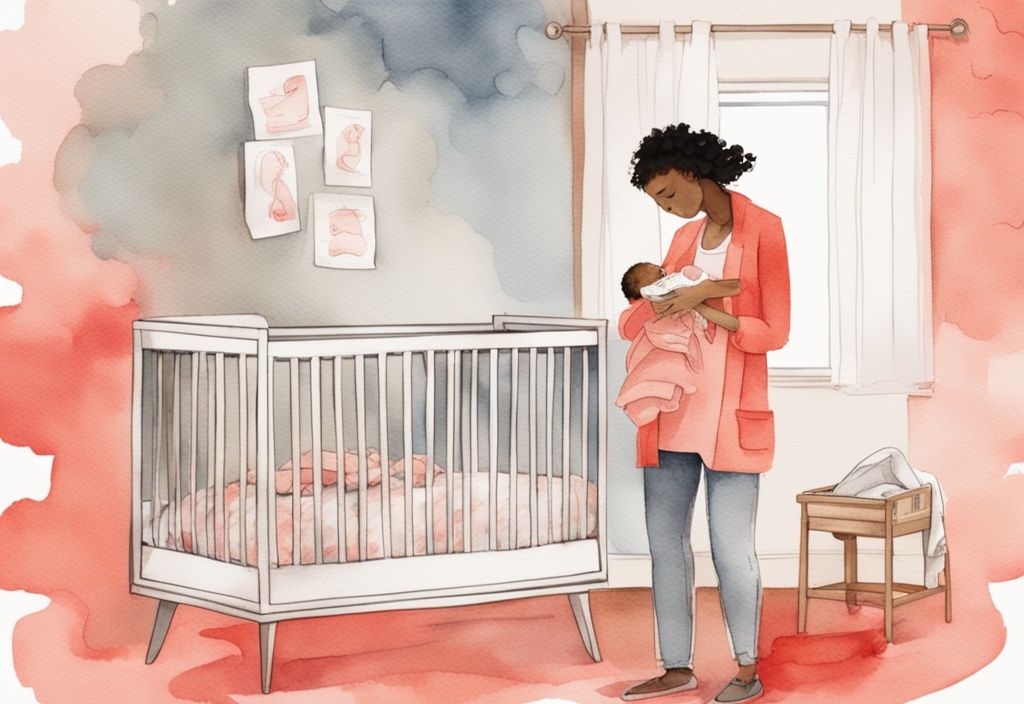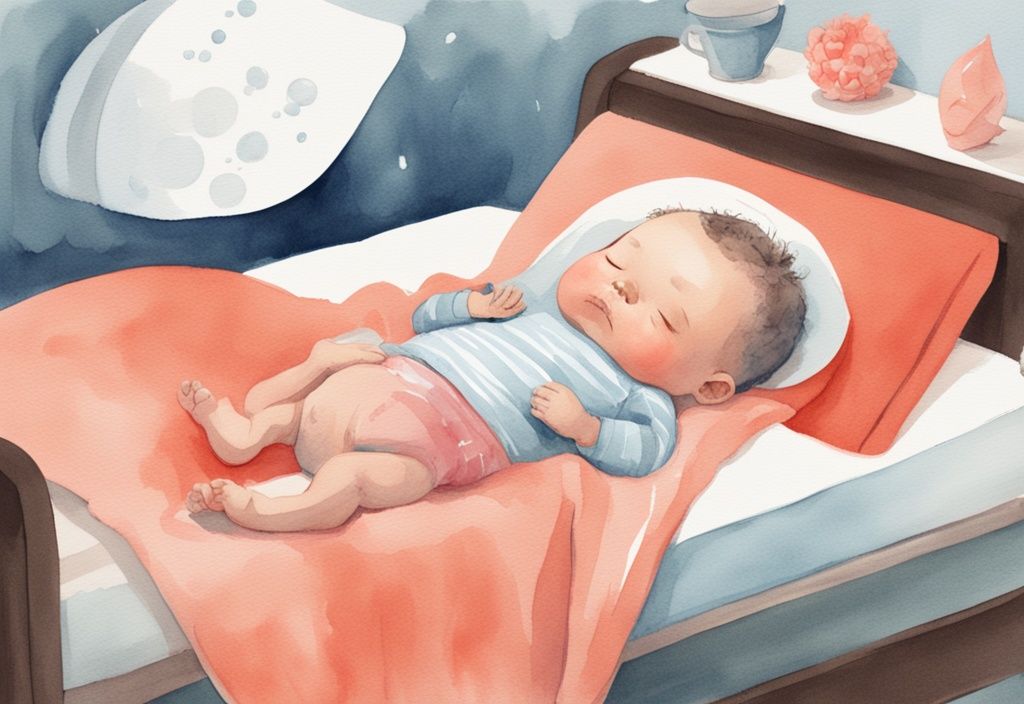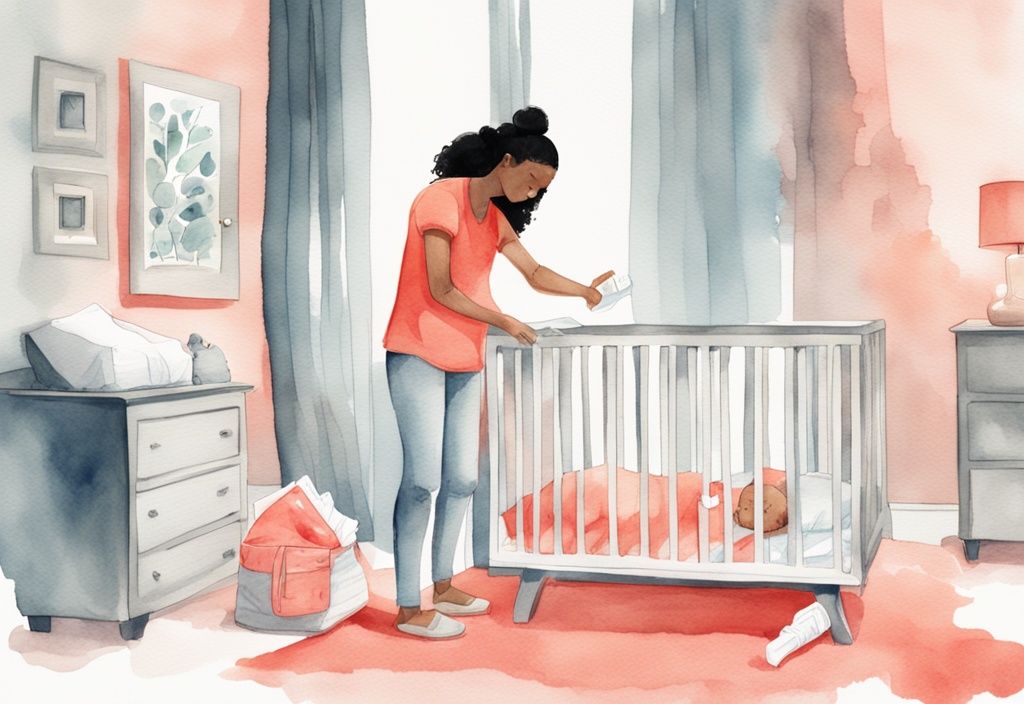Ever been startled awake by the sudden sense that your little one might have had a nighttime accident? You’re not alone, it’s a common hiccup in the lullaby land. The unexpected play of “diaper roulette” can put a big wrench in your baby’s peaceful slumbers and yours too.
This article is packed with practical advice to navigate through these squishy hush-hour moments seamlessly. We’re talking gentle nighttime diaper changes, creating a sleep environment that doesn’t crumble under a little poop-ocalypse, and more – all designed to make your nights a little less eventful and a lot more restful.
So join me as we unveil some tried and tested maneuvers to ensure a smoother sail into dreamland for you and your little one. Because let’s be honest, peaceful sleep is not a luxury, it’s a downright necessity for a happy, thriving parent-baby duo.
Immediate Steps to Take When Your Baby Poops While Sleeping
Dealing with nighttime diaper dilemmas can be challenging, but a few thoughtful actions can make the process smoother and less disruptive for your sleeping baby.
How to Check If Your Baby Is in Deep Sleep
When faced with the situation of what to do if baby poops while sleeping, it’s crucial to first determine if your baby is in a deep sleep. Gently lift one of your baby’s legs and then let it drop. If there is no reaction, it indicates that your baby is likely in a state of deep sleep. Additionally, observe your baby’s breathing patterns; stable and slow breaths are indicative of deep sleep, making it easier to proceed with a diaper change without fully waking them.
Lighting Techniques for a Stealthy Diaper Change
Effective lighting is essential for handling what to do if baby poops while sleeping with minimal disturbance. Utilize a sleep-safe nightlight or a Himalayan salt lamp, which emits warm, dim lighting. These options are designed to be gentle on your baby’s eyes and won’t disrupt their sleep cycle. Another excellent choice is red light, as it causes less disruption to sleep compared to other colors. Keep a small, dim flashlight handy to ensure you have enough visibility without using bright lights that could wake your baby.
Quick Diaper Change Without Disturbing Baby’s Sleep
Speed and preparation are key when figuring out what to do if baby poops while sleeping. Prepare all necessary items such as diapers, wipes, and spare pajamas before your baby goes to bed, ensuring everything is within arm’s reach.
Applying a thick layer of barrier cream during the nighttime routine can reduce the need for thorough cleaning at night. When changing the diaper, do so in the crib using minimal movements and gentle hands. Utilize a white noise machine to cover any sounds that could wake your baby during the process. Dress your baby in sleep sacks with easy diaper access to streamline the change, making it quicker and less intrusive.
Invalid YouTube video ID
Creating a Sleep Environment That Eases Nighttime Diaper Changes
Making diaper changes during the night smoother can significantly improve the overall sleep quality for both you and your baby. Here are some practical tips to help achieve this.
Using White Noise and Sleep Sacks
Using white noise machines can create a consistent and soothing background sound that masks any noise during a diaper change, reducing the chance of waking the baby. The repetitive hum of white noise mimics the sounds they heard in the womb, providing comfort and helping them stay asleep.
Sleep sacks are another excellent tool to simplify nighttime diaper changes. They offer easy access to the diaper area without the need to completely undress the baby. As your infant grows, you might wonder when your baby is too big for a bassinet and consider transitioning to a crib. Sleep sacks come with zippers or Velcro fasteners that allow for quick and quiet opening and closing, minimizing disturbance. When changing the diaper, simply unzip or unfasten the sleep sack, make the change, and reseal it with minimal fuss.
Dressing Baby for Easy Diaper Accessibility
Selecting the right nightwear can make all the difference in managing diaper changes without fully waking your baby. Opt for pajamas with zippers or snap closures, which can be opened quickly and silently compared to traditional buttons. Zippers, particularly, offer the advantage of swift access and are more user-friendly during those groggy nighttime moments.
For older babies who might be inclined to undo their pajamas, consider using zip-up onesies worn backward. This technique can prevent them from awakening and undoing the snaps, ensuring that the nightwear stays securely fastened. By making these thoughtful clothing choices, you enhance the ease and efficiency of nighttime diaper changes, contributing to a calmer and more restful sleep environment.
By creating such an accommodating sleep environment, you address what to do if baby poops while sleeping, making the process less disruptive for both you and your baby.

Preventative Measures to Minimize Nighttime Pooping
Syncing Sleep and Feeding Schedule
Establishing a consistent sleep and feeding schedule is a crucial step to help align your baby’s pooping times with their awake hours. Begin by feeding your baby at the same times each day and ensuring that meals are structured around their sleep routine. Over time, their digestive system will begin to adapt to this schedule, reducing the likelihood of nighttime bowel movements.
Additionally, gradually adjusting feeding times can further help in minimizing nighttime pooping. By slightly shifting the times you offer feedings, you can encourage bowel movements to occur during the day instead of at night. Remember, consistency is key here.
Promoting Digestive Health Through Baby’s Activities
Promoting your baby’s digestive health can significantly decrease nighttime pooping. Ensure that your baby gets ample playtime and movement throughout the day, as physical activity helps aid digestion.
Incorporating tummy time is particularly beneficial. It not only strengthens your baby’s muscles but also helps in facilitating digestion by applying gentle pressure to the abdomen.
Activities like gentle bicycling movements with their legs can also stimulate their digestive system. A healthy, active daytime routine will contribute to better-regulated bowel movements and less disruption at night.
Nighttime Diapers: Choosing The Most Absorbent Diapers
Choosing the right nighttime diapers is essential for keeping your baby comfortable and dry throughout the night. Opt for overnight diapers that offer superior absorbency to handle longer periods without needing a change. These diapers are specifically designed to hold more fluid and provide better leak protection.
Applying a thick layer of barrier cream before bedtime will further protect your baby’s skin from irritation caused by prolonged exposure to moisture. This combination ensures that even if your baby does poop while sleeping, they remain dry and less likely to wake up due to discomfort.
By following these preventative measures, you can create a more restful night for both you and your baby, effectively addressing the challenge if your baby poops while sleeping.
Tracking Your Baby’s Poop Patterns for Intuitive Responses
Modern Tools to Monitor Diaper Changes
Wondering what to do if baby poops while sleeping? Modern technology can be a lifesaver. Smartphone apps designed to track diaper changes and sleep patterns are incredibly helpful. You can record each diaper change, noting the time, frequency, and even the consistency of the poop. Over time, you’ll start to see trends, helping you make informed adjustments to your baby’s schedule.
If you’re more of a pen-and-paper person, maintaining a physical log can be just as effective. By logging each diaper change, you create a tangible record that can help you spot patterns. For example, you might notice certain feeding times lead to nighttime poops. This insight lets you tweak feeding schedules to reduce nighttime disruptions.
Signs That Your Baby Has Pooped During Sleep
Knowing the signs that your baby has pooped during sleep is key to quick action without fully waking them. The most obvious sign is a change in odor coming from the crib. A strong, unpleasant smell is usually a clear indicator that a diaper change is needed.
Look for signs of discomfort too. Increased fussiness or restlessness often means something is up. Babies might exhibit more movement or may briefly wake up due to the discomfort of a soiled diaper.
Unusual wakefulness is another clue. If your baby is waking more frequently or showing signs of irritability, it could be because they’ve pooped. Monitoring these symptoms helps you act swiftly, ensuring minimal sleep disruption.

How a Food Log Can Help Track Baby’s Poop Pattern
Keeping a detailed food log can be a game-changer when figuring out what to do if baby poops while sleeping. Recording what and when your baby eats helps you establish a direct link between their diet and poop patterns. By noting the timing and content of meals, you can better predict when bowel movements are likely to happen.
It’s also important to identify specific foods that might cause digestive issues or more frequent pooping. Certain types of food can make your baby’s digestive system more active, leading to nighttime poops. Adjusting the introduction and timing of these foods can improve both digestive health and sleep quality, reducing the chances of nighttime poops.
Soothing Techniques If Your Baby Wakes Up During a Diaper Change
Calm Baby Down with These Rocking Techniques
If your baby poops while sleeping and wakes up during a diaper change, gentle rocking motions can be your best ally in getting them back to sleep. Cradling your baby in your arms and swaying side to side helps to recreate a familiar, womb-like sensation, comforting them effectively. Don’t rush this—it’s about making them feel secure again.
Incorporating a slow, rhythmic bounce as you rock can also help soothe them quickly. Hold your baby close to your chest, letting the warmth and security of your body provide additional comfort. The proximity also allows them to hear your heartbeat, an auditory cue that many babies find reassuring and sleep-inducing.
The Role of Pacifiers in Soothing Awakened Babies
Pacifiers can play a vital role in calming a baby who wakes up during a diaper change, especially if they’ve pooped while sleeping. Offering a pacifier provides immediate comfort, helping the baby to self-soothe through the familiar sucking motion.
This can be particularly useful in distracting the baby during the remainder of the diaper change. The action of sucking on a pacifier releases endorphins, promoting relaxation and a quicker return to sleep. Keep a clean pacifier handy to promptly offer the baby if they wake up and become fussy during a late-night diaper change.
Dealing with Constant Night-time Pooping: When to Seek Medical Advice
Night-time pooping can be an unexpected challenge for many parents. Understanding the causes and solutions helps in managing this routine disruptor effectively. From feeding adjustments to recognizing abnormal patterns, let’s explore ways to ensure a more peaceful night for both you and your baby.
Feeding Adjustments to Improve Baby’s Digestion
Adjusting your baby’s feeding schedule can significantly contribute to minimizing nighttime pooping episodes. Creating a gap between feeding and sleeping is crucial. This allows ample time for digestion before your baby goes to bed, helping to align bowel movements with waking hours.
For breastfeeding mothers, consider feeding your baby a bit earlier in the evening. If you are bottle-feeding, ensure the last feeding session isn’t too close to bedtime.
Introducing solid foods into your baby’s diet requires careful monitoring. Start with easily digestible options and give your baby’s digestive system time to adjust. Observe your baby for any reactions or changes in poop patterns with the introduction of new foods.
Gradually increase the variety and quantity of solids, keeping an eye on any signs of digestive upset. This careful approach can help in managing and potentially reducing nighttime bowel movements.

Recognizing Abnormal Poop Patterns and When to Be Concerned
Understanding what’s normal and what’s not in your baby’s poop patterns is essential. Pay close attention to the color, consistency, and frequency of their bowel movements.
Normal baby poop can vary widely, but any sudden changes should be noted. If you observe very loose or watery stools, unusual colors like green or black, or a frequency that breaks from the norm, it may be time to seek further insight.
Excessive nighttime pooping can signal underlying digestive issues. If your baby shows signs of discomfort, persistent diarrhea, or if their bowel movements become more frequent and disrupt their sleep consistently, consulting a pediatrician is advisable.
Early medical advice can help address potential health concerns and provide strategies for better managing your baby’s nighttime pooping and overall digestive health.
Conclusion
Every parent faces the challenge of nighttime pooping in their baby’s sleep. It’s a common occurrence influenced by feeding routines, developmental stages, and sleep patterns. Knowing what to do if baby poops while sleeping is crucial for maintaining your baby’s comfort and health.
A key takeaway is the need for a quick, calm diaper change to prevent skin irritations and ensure the baby remains undisturbed. Prepare in advance with the right tools, such as sleep sacks, dim lighting, and white noise. This streamlines the process, making it less stressful for both baby and parent.
Creating a conducive sleep environment includes using highly absorbent nighttime diapers and applying barrier creams to minimize discomfort. Dress your baby in easily accessible sleepwear and monitor their sleep and poop patterns to respond more intuitively to their needs.
Patience and consistency in these strategies are essential. As your baby’s digestive system matures, the frequency of nighttime pooping generally decreases, leading to better sleep for both baby and parent. Every effort contributes to a smoother experience, and with time, these nighttime challenges will become more manageable.
FAQ
Is immediate diaper change necessary when my baby poops while sleeping?
Yes, it’s crucial to change the diaper immediately to prevent diaper rash and other skin irritations. Promptly taking off a soiled diaper minimizes the risk of infection and keeps your baby comfortable. Trust me, a little disruption now can save you more trouble later.
How to change my baby’s diaper without waking them up?
It’s all about being gentle and prepared. Use dim lighting so the room isn’t too bright. Have everything you need within reach, and consider using a sleep sack and white noise to help keep your baby asleep. Gentle handling is key—try to minimize movement and avoid sudden noises. Before you know it, you’ll be a pro at this.
What should I look for to know my baby has pooped in their sleep?
Trust your instincts here. Pay attention to any odors or signs of discomfort like sudden fussiness or changes in their sleep pattern. If your baby starts moving more than usual, it might be a clue that something needs attention. You’ll get the hang of recognizing these little signals.
Which diapers are best to prevent baby waking up due to nighttime pooping?
Highly absorbent nighttime diapers can be a game-changer. They are designed to keep your baby dry longer, reducing the chances of waking up. Also, a thick barrier cream can offer extra protection for your baby’s skin. Trying out a few brands might help you find the perfect fit for your little one’s needs.
When should I be worried about my baby’s frequent nighttime pooping?
If there’s a sudden change in your baby’s poop patterns, or if the poop has an unusual color or consistency, it might indicate a digestive issue. Frequent nighttime pooping can be a sign of underlying health problems, so don’t hesitate to seek medical advice. Remember, it’s always better to be safe and consult your pediatrician.


